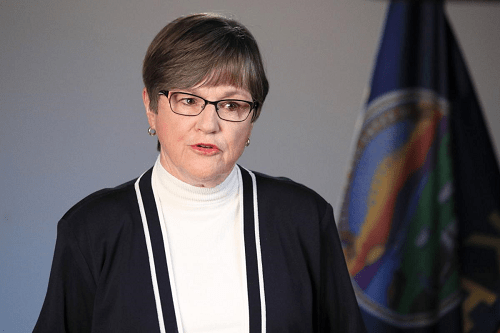
TOPEKA, Kan. (AP) – By JOHN HANNA and HEATHER HOLLINGSWORTH Associated PressApr 30, 2020 Updated Apr 30, 2020
Gov. Laura Kelly announced Thursday that she will allow many Kansas businesses to reopen next week if they can maintain social distancing and said she hopes to lift all coronavirus-inspired state limits on mass gatherings and other restrictions by June 15.
Kelly said in a televised speech that she is lifting a statewide stay-at-home order Monday and moving to gradually reopen the state’s battered economy. But her plan won’t allow bars, gyms, theaters, barbershops, hair and nail salons or state-owned casinos to reopen until at least May 18. Also, local officials will be allowed to impose their own, stricter rules.
The governor outlined her plan as Kansas saw its largest spike in confirmed coronavirus cases since its first in early March. Cases jumped by 500 or 13.4% in a single day, to 4,238, largely because of spikes in counties with meat-packing plants and at a state prison. COVID-19-related deaths reached 129, up four.
Meanwhile, the Kansas Department of Corrections said it had begun testing all of the more than 1,730 inmates at the Lansing Correctional Facility, outside the Kansas City area. The number of COVID-19 infections among inmates there who were swabbed after showing symptoms or being housed alongside sick inmates grew to 88.
Kelly called her plan an effort to balance “non-negotiable public health considerations with jaw-dropping, unsustainable economic realities.”
“Kansas will approach this process slowly, gradually and cautiously,” she said in her speech.
The Democratic governor has been under pressure from the Republican-controlled Legislature to lift restrictions in the wake of a surge of claims for unemployment benefits and expectations of a sharp drop in state revenues.
The state Department of Labor reported that 27,663 more Kansas workers filed initial unemployment claims last week, up dramatically from 1,323 during the same week a year ago but down from the 31,849 new claims from two weeks ago.
Top Republican legislators criticized Kelly for treating businesses differently. Senate President Susan Wagle, a Wichita Republican, told reporters during an online Zoom video conference that owners of all kinds of businesses believe they can operate safely with social distancing and other steps, such as deep cleaning.
“We’ve got more bankruptcies coming down the pike every week,” said Wagle, a U.S. Senate candidate and frequent Kelly critic who outlined her own, less restrictive plan earlier this week. “The economy is hitting the cliff. Money’s not coming in. People are having a hard time paying their bills.”
Kelly’s plan envisions four phases to reopening the economy, each lasting 14 days — or more, if public health data calls for lengthening them. Her plan assumes that legislative leaders extend a state of emergency set to expire May 15, for another month. She issued an executive order Thursday to put the first phase into effect.
“All of the steps carry benefits and unavoidable risk,” Kelly said.
In Johnson County, the state’s most populous country, and neighboring Wyandotte County in the Kansas City area, officials issued stay at home orders through May 10. The area was the state’s first coronavirus hot spot, and the two counties together account for 95 or nearly 74% of the state’s COVID-19-related deaths.
For most people, the coronavirus causes mild or moderate symptoms clearing up in two to three weeks. For some, especially older adults and people with existing health problems, it can cause more severe illness or death.
The actual number of cases is thought to be far higher than the number confirmed because of limited testing. Also, studies suggest people can be infected without feeling sick.
Under Kelly’s plan, bars and nightclubs can continue to offer curbside drink service but won’t be allowed to open to patrons until at least May 18, and then at half capacity.
Restaurants don’t face capacity limits but must observe limits on mass gatherings in entrances and lobbies. If tables reach the mass-gathering limits, they must be 6 feet from other tables. If restaurants want to seat people in back-to-back booths, they must erect barriers between them.
Her plan calls for limiting mass gatherings to 10 until May 18, to 30 until June 1 and 90 until June 15. Businesses also are getting industry-specific guidance on a state website, and people are strongly encouraged to wear masks in public.
Churches won’t have to follow the mass-gathering rules if they practice social distancing, deep clean their facilities and follow other guidance, such as not passing collection plates. Kelly had ordered them to limit the number of congregation members for in-person services to 10, but two churches and their pastors sued her.
“I don’t know if life will ever truly ever go back to ‘normal,” Kelly said.
The governor also is feeling pressure from prison inmates’ families to release some prisoners early. She has said she will announce a plan for that but has suggested it won’t affect large numbers.
At the Lansing prison, 75% of 240 inmates from one unit with open dormitory living were found to be positive and not showing symptoms of the disease, though the Department of Corrections said the exact number wasn’t available yet. Seventy-nine staff members — or 19% of its workforce — also have been infected. A facility-wide quarantine will be in place for a minimum of 14 days.
———
Hollingsworth contributed from Mission, Kansas.
———
Follow John Hanna on Twitter: https://twitter.com/apjdhanna
———
Check out more of the AP’s coronavirus coverage at https://apnews.com/VirusOutbreak and https://apnews.com/UnderstandingtheOutbreak
Copyright 2020 The Associated Press. All rights reserved. This material may not be published, broadcast, rewritten or redistributed without permission.
